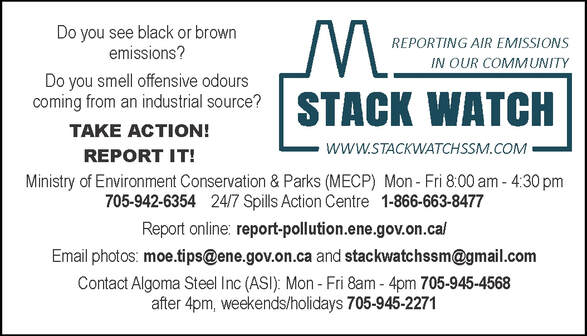Read April 22, 2023 Clean North blog post on industrial air pollution
Why report pollution?
Sault Ste. Marie has a serious pollution problem, as evidenced by our having one of the highest cancer rates in the province. The area around Algoma Steel (ASI) has one of the highest rates of acute myeloid leukemia in Canada. In addition, a study showed that exposure to air pollution near ASI affected heart rate variability, which can contribute to cardiac issues.
Meanwhile, ASI continues to have exemptions from provincial pollution regulations (called site-specific standards) that allow them to emit higher than the provincial limit of benzene, a known carcinogen, and of particulates.
We at Clean North believe it’s possible to have a strong economy and a safe environment for people. In addition, high rates of cancer and other illnesses influenced by pollution come with a cost to people and their families and the healthcare system. So we encourage Saultites to be on the lookout for, document, and report pollution incidents. The more attention we call to such incidents, the more likely they will to be taken seriously.
We also suggest contacting the provincial minister of the environment and our MPP Ross Romano to ask for a monitoring system equivalent to Hamilton’s. FYI:
- Hamilton has 2 steel mills located in the city centre on the shore of Lake Ontario and 14 air monitoring stations, two of which are operated by MECP (Ministry of Environment, Conservation and Parks).
- In the Sault:
- MECP operates one monitoring station at Sault College — not in an area of the city most affected by ASI pollution.
- Two other stations are run by Algoma Steel (not independent).
More about reporting….

The Stack Watch SSM website is an excellent resource for those wishing to report pollution. This group is dedicated to closing the gap between industrial air pollution regulations and enforcement by getting we, the people involved in monitoring and reporting. The two primary goals:
- Encourage the Ontario Government to enforce its air emissions regulations more routinely
- Encourage the government and Algoma Public Health to erect an independently operated and geographically diverse air-quality monitoring network
